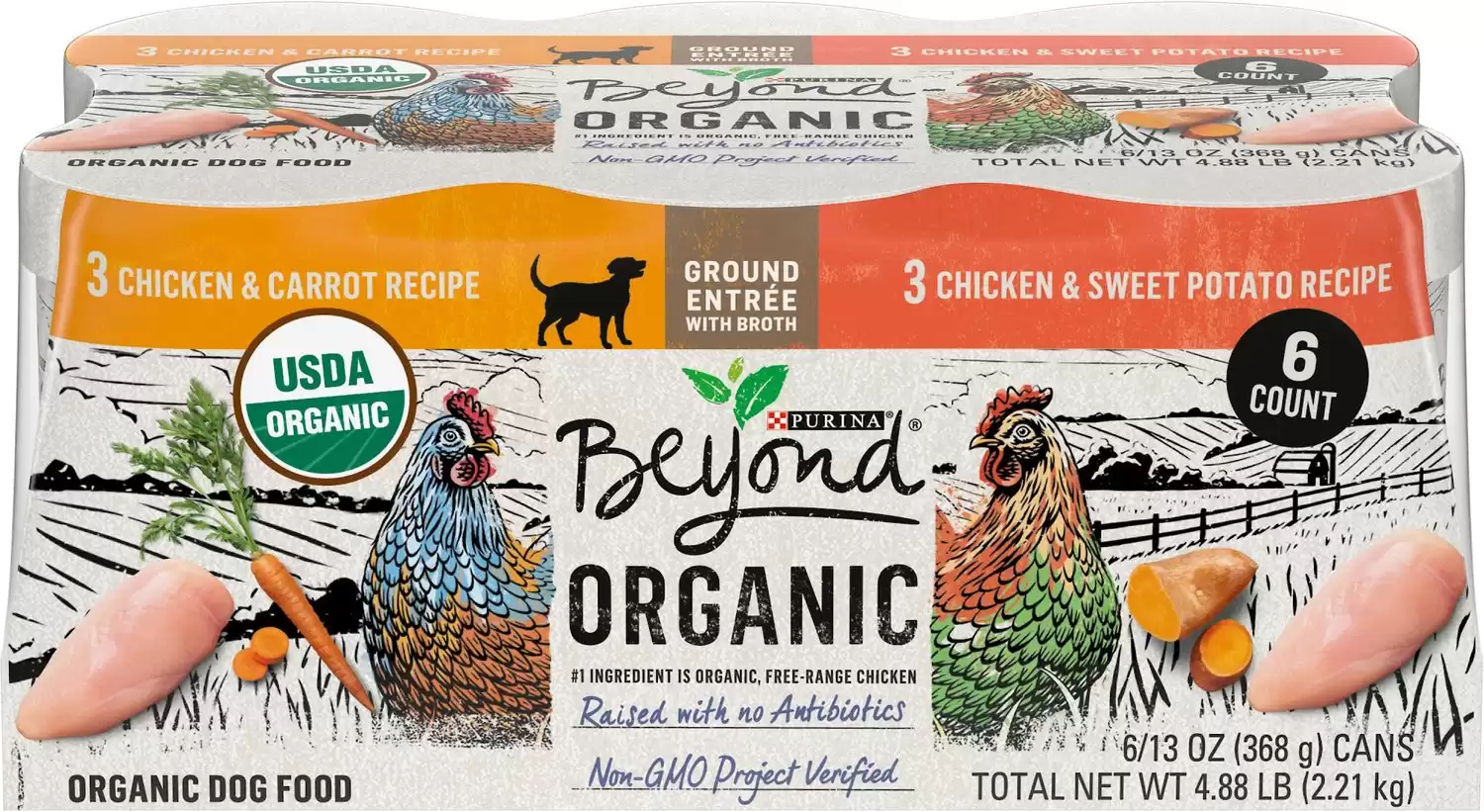Yorkie Bichon
Canis lupus
Yorkie Bichons can come in a wide range of colors including black, white, blonde, gray, golden, or dark brown.
Advertisement
Yorkie Bichon Scientific Classification
- Kingdom
- Animalia
- Phylum
- Chordata
- Class
- Mammalia
- Order
- Carnivora
- Family
- Canidae
- Genus
- Canis
- Scientific Name
- Canis lupus
Read our Complete Guide to Classification of Animals.
Yorkie Bichon Conservation Status
Yorkie Bichon Facts
- Fun Fact
- Yorkie Bichons can come in a wide range of colors including black, white, blonde, gray, golden, or dark brown.
- Temperament
- Fun-loving, friendly, and independent
- Diet
- Omnivore
Yorkie Bichon as a Pet:
- General Health
- Energy Level
- Shedability
- Trainability
- Intelligence
- Tendency to Chew
- Size
- Family and kid friendliness
- Yappiness / Barking
- Moderate
- Separation Anxiety
- Moderate
- Preferred Temperature
- Average climate
- Exercise Needs
- Moderate
- Friendly With Other Dogs
- Moderate
- Pure bred cost to own
- $400 to $900
- Dog group
- Non-sporting
- Male weight
- 6-8 lbs
- Female weight
- 6-8 lbs
This post may contain affiliate links to our partners like Chewy, Amazon, and others. Purchasing through these helps us further the A-Z Animals mission to educate about the world's species.
View all of the Yorkie Bichon images!
Yorkie Bichons can come in a wide range of colors including black, white, blonde, gray, golden, or dark brown.
Yorkie Bichons are a hybrid breed created by mixing a Bichon Frise with a Yorkshire Terrier. Also called Yorkshire Frises, Bichyorkies, Yorkie Chons, and Bichon Yorkies, these dogs are playful and intelligent. They can be independent, but generally prefer to spend most of their time with a trusted member of the family. Their personalities make them good family dogs for homes with older children. Yorkie Bichons have an average lifespan of 10 to 12 years.
See all of our expert product reviews.
3 Pros and Cons of Owning a Yorkie Bichon
| Pros! | Cons! |
|---|---|
| Intelligent: Yorkie Bichons are smart dogs who can be easy to train, especially when they are still a puppy. | Challenging to groom: Yorkie Bichons can be challenging to groom and may require visits to a professional groomer. |
| Hypoallergenic: This breed does not shed and is a good choice for a home with allergy suffers. | May suffer from separation anxiety: Bichons are prone to separation anxiety, so depending on the mix of genes your dog inherits, this crossbreed may also face separation anxiety when left alone. |
| Friendly: These dogs are friendly with their families and other trusted individuals. | Not ideal for homes with young children: Because of their small size, Yorkie Bichons could be injured by a toddler who doesn’t know how to interact appropriately with a dog. |
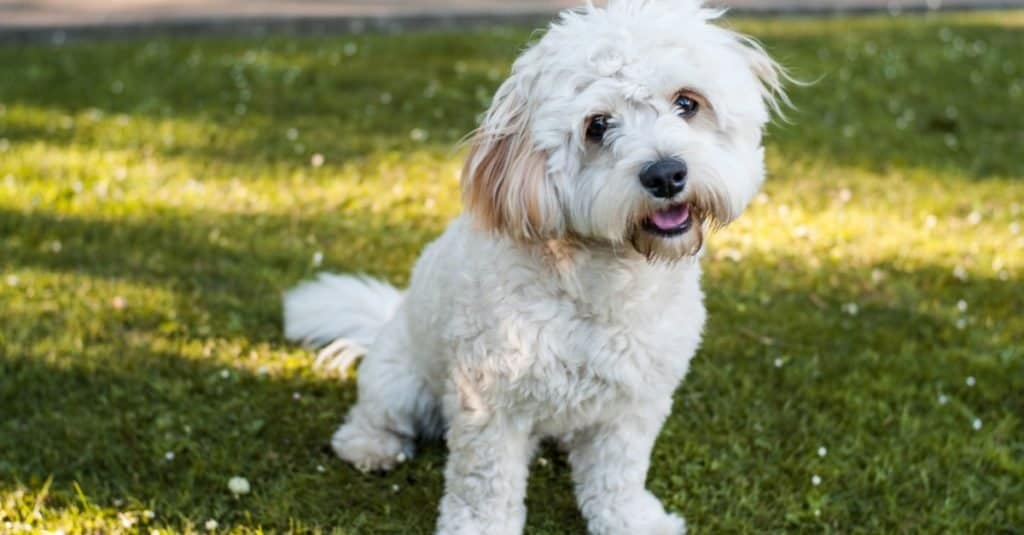
Yorkie Bichons are smart and easy to train.
©gabriel12/Shutterstock.com
Size and Weight
The Yorkie Bichon is a toy-sized dog breed. Males and females are both between 9 and 12 inches tall and only weigh between 6 and 8 pounds.
| Height (Male) | 9 inches to 12 inches |
| Height (Female) | 9 inches to 12 inches |
| Weight (Male) | 6 pounds to 8 pounds |
| Weight (Female) | 6 pounds to 8 pounds |
Evolution and History
There isn’t a lot known about when the first Yorkie Bichon was bred, but it was likely within the past 20 years or so in the U.S. when designer dog breeds were gaining popularity.
Looking at its parent breeds the Yorkshire Terrier and the Bichon Frise is one way to consider this hybrid’s history. As they are both small breeds, the Yorkie Bichon takes after its parents in its size and typically only weighs between 6 and 8 pounds.
Health and Entertainment for your Yorkie Bichon
See all of our expert product reviews.
While Yorkshire terriers originated in Yorkshire in England during the industrial revolution of the 1800s, Bichons have French and Spanish ancestors. Initially used to catch and kill rats and other vermin in the mines and textile mills, Yorkies progressed to hunting bigger game in forests and as their popularity increased they became luxury pets valued for their small size and silky hair. Bichons were used by the Spanish for sailing and herding dogs and by the French as lapdogs of nobility. They were also featured in circuses where their agility, entertaining personalities, and skills in performing tricks were well used. Yorkies were recognized by the American Kennel Club in 1885 and the English Kennel Club in 1886. Bichons were recognized by the American Kennel Club in 1972.
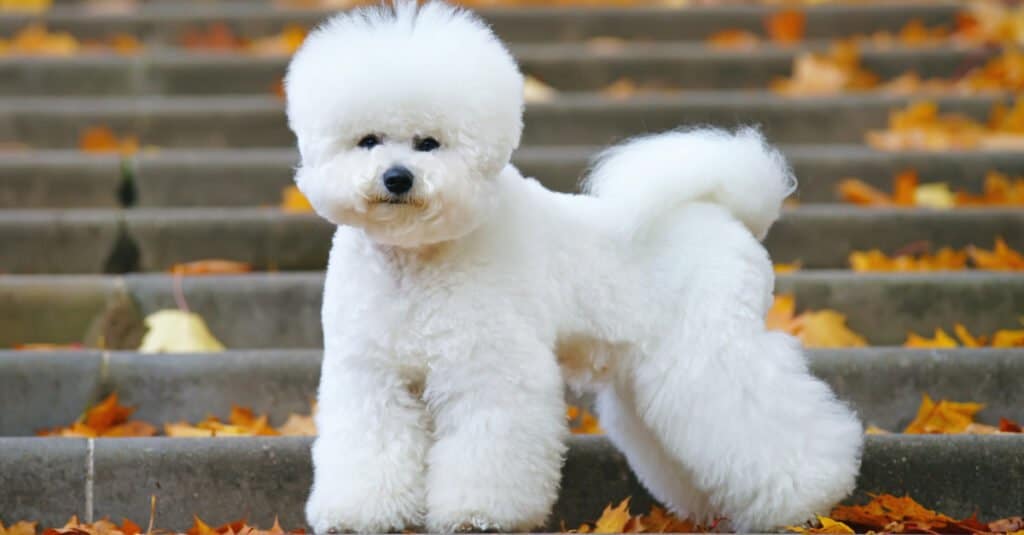
The Bichon Frise is one of the Yorkie Bichon’s parent breeds.
©Eudyptula/Shutterstock.com
Common Health Issues
Before purchasing a Yorkie Bichon, it is a good idea to familiarize yourself with some potential health issues this breed may face. This will ensure you are prepared to offer your dog the best care possible and aware of some signs that may indicate that a trip to the vet is necessary.
Hypothyroidism is one potential issue to be on the lookout for with Yorkie Bichons. The thyroid in dogs with hypothyroidism is underactive, which can cause dogs to be lethargic or gain weight. You may also notice changes in your Yorkie Bichon’s coat or skin.
Another health issue some Yorkie Bichons face, like their parent breed Yorkshire Terriers, is progressive retinal atrophy (PRA). This is a degenerative eye disease that can cause blindness in dogs. The photoreceptor cells deteriorate and gradually cause the dog to lose their vision. There is currently no treatment for PRA.
Patellar luxation is a third health concern for Yorkie Bichons and is common among their parent breeds Yorkies and Bichons. Also called a slipped kneecap, patellar luxation may cause a dog to look like they’re skipping or may cause lameness in one of its legs. The kneecap generally slips back into place, but you should consult with your vet if you suspect your Yorkie Bichon may be suffering from patellar luxation.
To recap, some of the common health concerns for Yorkie Bichons include:
- Hypothyroidism
- Progressive retinal atrophy
- Patellar luxation.
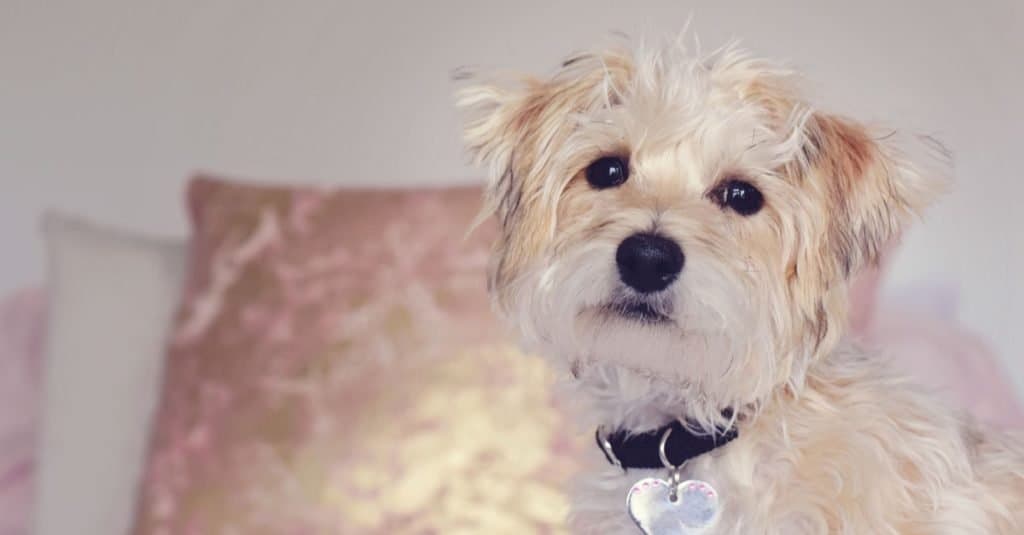
Yorkie Bichons can suffer from health issues such as progressive retinal atrophy.
©Rhonda Sancricca/Shutterstock.com
Temperament and Behavior
The exact temperament of a Yorkie Bichon can vary depending on which traits it inherits from its Bichon Frise and Yorkshire Terrier parents. In general, however, Yorkie Bichons can be independent, but still, enjoy spending time with their family. Most are fun-loving and enjoy being the center of attention at times as well.
Some Yorkie Bichons may develop separation anxiety like their Bichon parents if left alone for too long. They may also exhibit destructive behaviors when alone or bored. Training your Yorkie Bichon from a young age and ensuring they have enough toys to keep them entertained when alone will be important. Overall, though, a Yorkie Bichon’s personality makes it a great addition to a family.
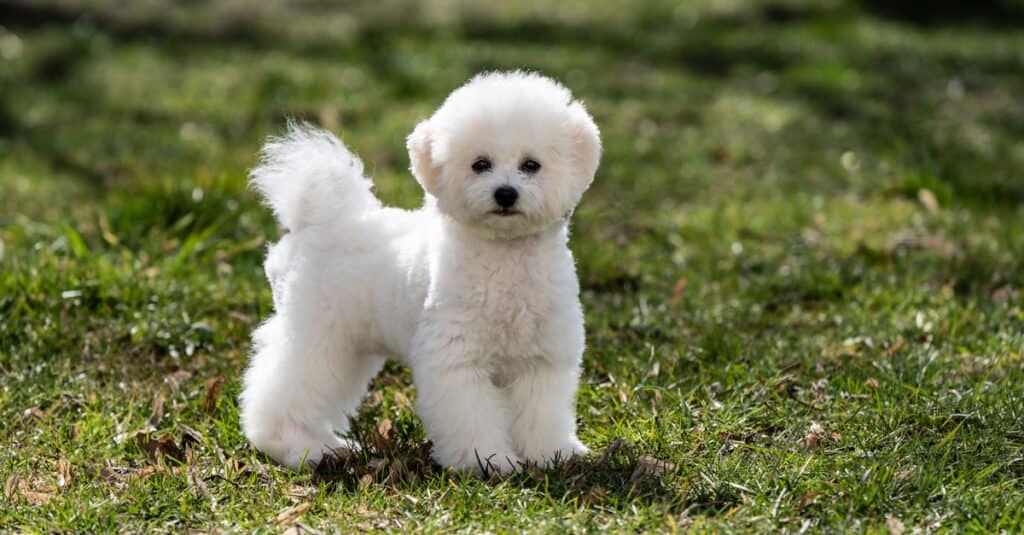
Like parent breed the Bichon Frise, a Yorkie Bichon may develop separation anxiety if left alone for long periods.
©Ieva Tvaronavicute/Shutterstock.com
How to Take Care of a Yorkie Bichon
As you prepare to care for a new Yorkie Bichon, keep the nutritional needs, potential health concerns, temperament, and other important information about this breed in mind. Each dog breed is unique, and the care your dog will need will differ from what other breeds require.
The Best Dog Food for Yorkie Bichons
Most Yorkie Bichons also need about a ½ cup of food each day due to their small size. However, since each dog is different, you should consult with your veterinarian when developing a feeding schedule for your dog. A Yorkie Bichon’s weight, age, metabolism, health concerns, and other items can all impact how much food they’ll require. Choose a high-quality food designed for small dogs to feed your Yorkie Bichon. Keep in mind that this breed could easily become overweight, so take care to feed the correct amount of food and portion their food into two meals each day.
Yorkie Bichon puppies have much smaller stomachs. Until the puppies are six months old, they will need to be fed between three and four times each day. After the age of six months, switching to just two meals a day should be fine.
The hypothyroidism that Yorkie Bichons can experience may sometimes be linked to ingesting harmful things like unnatural preservatives and pesticides. One of the best ways to get around questionable additives is by feeding your Yorkie Bichon organic dog food.
That’s why, at A-Z Animals, we suggest giving Yorkie Bichons Purina Beyond Organic High Protein Dry Dog Food & Wet Dog Food.
This antioxidant and nutrient-rich dog food uses certified organic ingredients with no synthetic fertilizers or pesticides that might disrupt your Yorkie Bichon’s endocrine system and lead to hypothyroidism. Plus, it’s specially formulated for small dogs.
Consider purchasing Purina Beyond Organic High Protein Dog Food on Chewy or Amazon.
- Beyond Organic non-GMO dog food pate with free-range chicken
- No prohibited synthetic pesticides or fertilizers
- Added vitamins and minerals and with no artificial colors, flavors or preservatives
- No corn, wheat, soy or poultry by-product meal
Maintenance and Grooming
The coat of a Yorkie Bichon will require regular brushing. Their hair can easily become matted and tangled, so take care to brush them every day. You’ll likely find that you also need to give your dog a haircut or schedule an appointment with a groomer to have their hair trimmed as well. This will prevent it from getting too long and getting in their face or becoming too tangled.
Be sure to also brush your dog’s teeth daily and keep their nails trimmed. Like with their parent breed Yorkies, Yorkie Bichons’ ears should be checked regularly and kept free of debris and wax build-up.
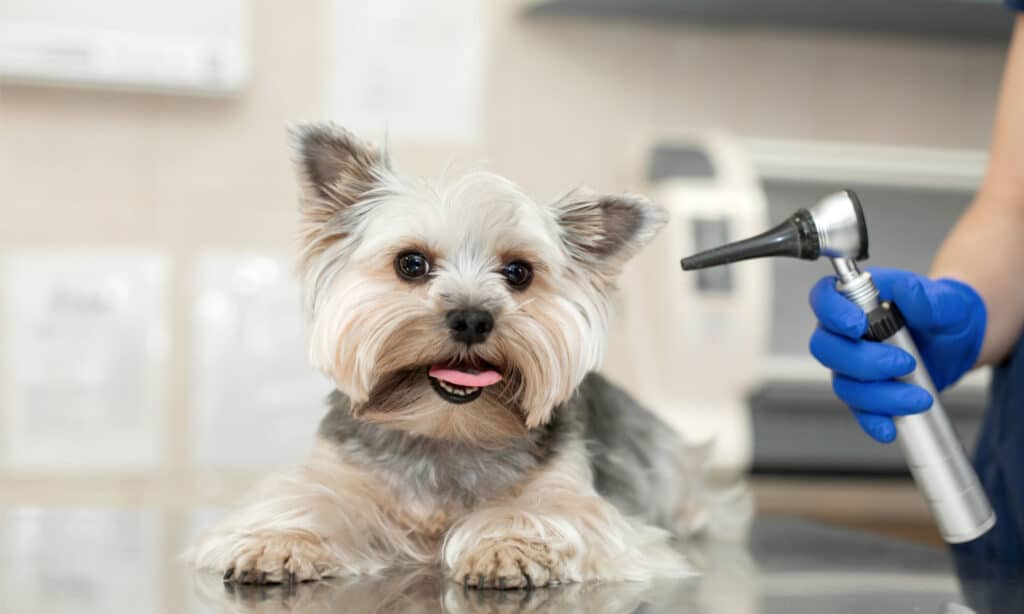
Like parent breed Yorkshire Terriers, Yorkie Bichons’ ears should be checked regularly.
©iStock.com/Kateryna Kukota
Training
Since Yorkie Bichons are intelligent, training them can be easy. This is especially true while they are still puppies and more eager to learn. This crossbreed is also known to be stubborn at times, which can make training more difficult. Use positive training methods and keep your training sessions fun for your pup for the best results. You may even be able to teach your Yorkie Bichon to do some tricks or complete an obstacle course.
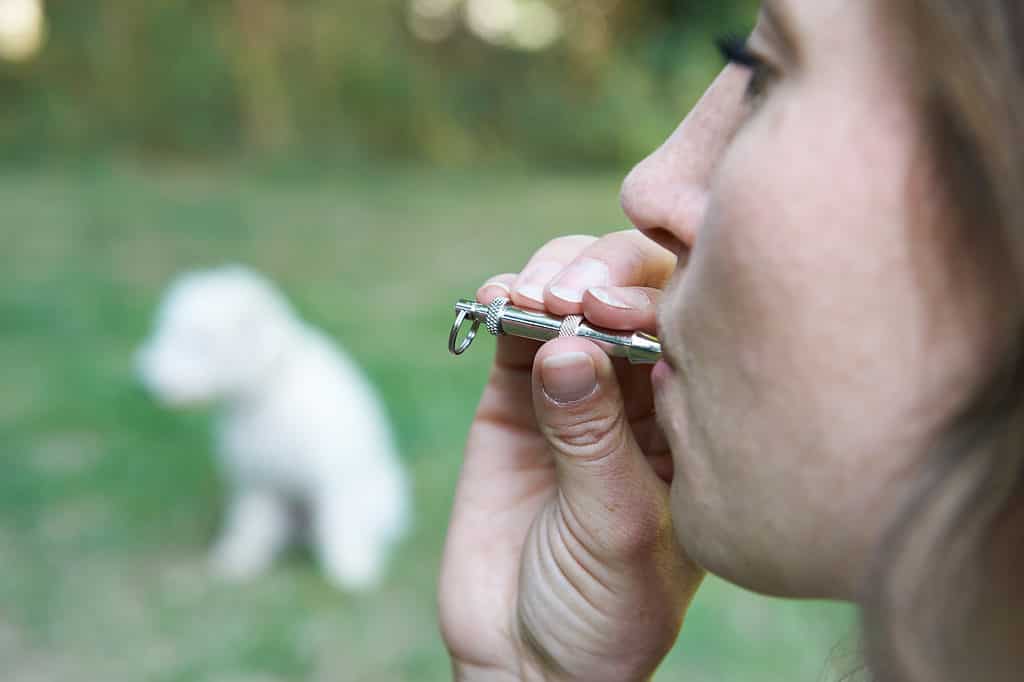
Training Yorkie Bichons can be sometimes harder due to their stubbornness at times.
©SpeedKingz/Shutterstock.com
Exercise
Making sure your Yorkie Bichon gets enough exercise is also important. Aim to take them for at least one walk each day and give them time to play either inside or in a fenced-in backyard. Giving your Yorkie Bichon enough exercise can prevent them from getting too bored and engaging in destructive behaviors.
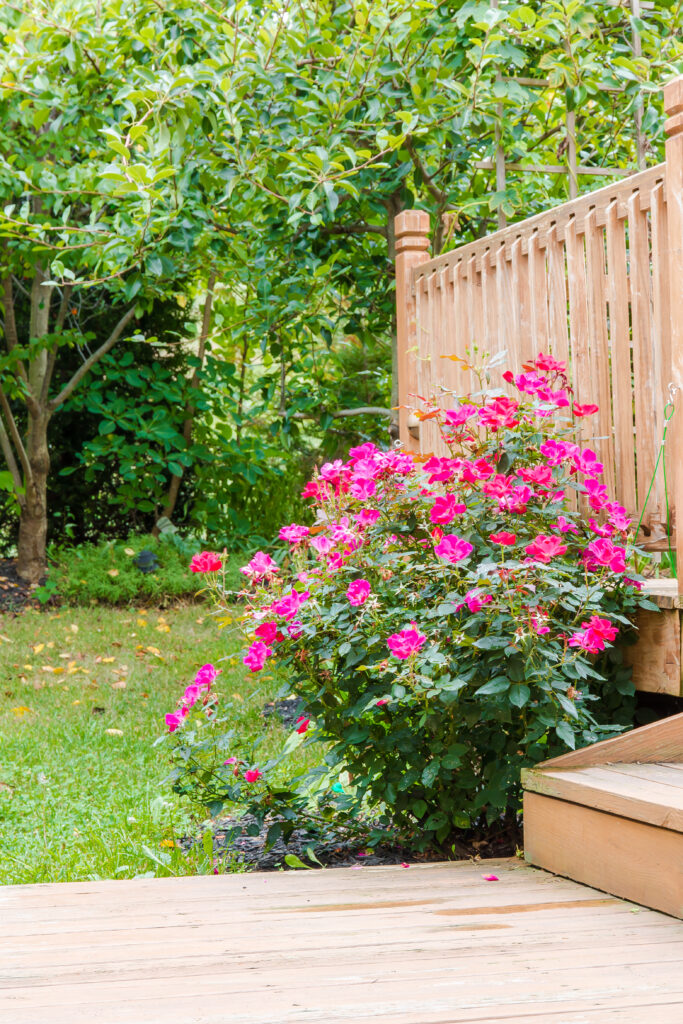
Give Yorkie Bichons time to play inside or in a fenced-in backyard.
©iStock.com/volgariver
Puppies
An adult Yorkie Bichon only weighs between 6 and 8 pounds, so it shouldn’t be difficult to imagine how small puppies will be. Due to their very small size, Yorkie Bichon puppies can easily be injured and should be handled very carefully. It is not advisable to have puppies around small children who may not fully understand how to be gentle.
As soon as you bring your Yorkie Bichon home, like with its parent breeds, you should begin the process of training and socializing. This will ensure the pup understands how to act in different situations and around different individuals.
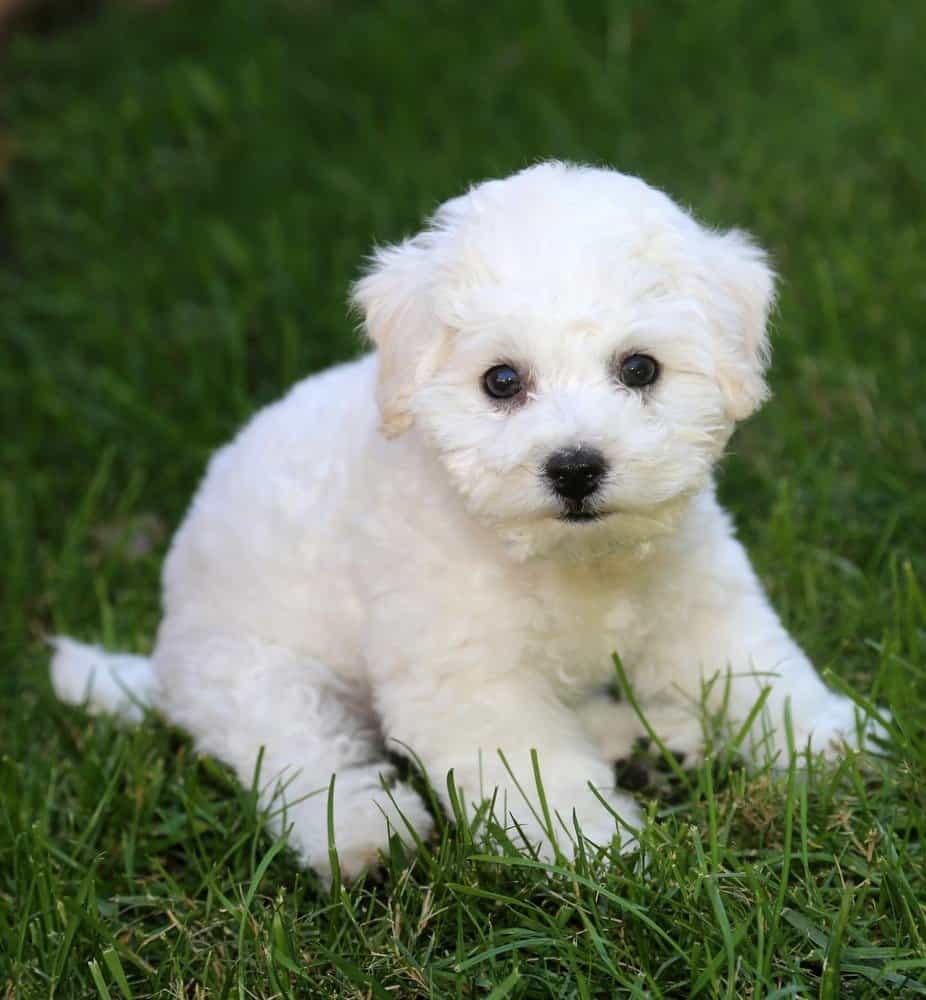
Yorkie Bichon puppies, like their parent breed BIchons, should be socialized as early as possible.
©mikeledray/Shutterstock.com
Yorkie Bichons and Children
Yorkie Bichons are a great fit for homes with children. They can be playful and enjoy snuggling up with a child. If you have young children, however, you’ll need to watch them very closely if they’re around the Yorkie Bichon. This breed is very small and could easily be injured by a small child. This is especially true when they are still puppies and are even more delicate.
Dogs Similar to the Yorkie Bichon
Yorkshire Terriers, Bichon Frises, and Morkies are three dog breeds similar to the Yorkshire Frise.
- Yorkshire Terrier: Yorkshire Terriers are one of the parent breeds of a Bichon Yorkie. Both breeds are playful and love being the center of attention. Bichon Yorkies may suffer from separation anxiety due to the trait they inherit from their Bichon parent, but Yorkshire Terriers are not likely to develop separation anxiety.
- Bichon Frise: The Bichon Frise is the other parent breed of a Yorkie Bichon. Both breeds are very intelligent and easy to train. Even though Bichons are small dogs, their average weight of 12 to 18 pounds is higher than the 6- to 8-pound average weight of a Bichon Yorkie.
- Morkie: Morkies and Bichon Yorkies both have one parent that is a Yorkshire Terrier. The other parent breed of a Morkie is a Maltese, while the other parent breed of a Yorkie Bichon is a Bichon Frise. Both breeds are also hypoallergenic. Morkies are larger than Bichon Yorkies and generally weigh around 13 pounds compared to the 6 to 8 pounds that Yorkie Bichon weighs.

The Morkie shares the parent breed of Yorkshire Terrier with the Yorkie Bichon.
©BGSmith/Shutterstock.com
Famous Yorkie Bichons
While there might not be many individual well-known Yorkie Bichons, some dogs from the parent breeds of this hybrid are nationally and internationally famous!
Smoky, a Yorkshire Terrier, became famous as a war dog in World War II. She was found by a U.S. soldier in the New Guinea jungle in 1944 and sold to Corporal William A. Wynne from Ohio. She accompanied him on combat, rescue, and photo reconnaissance missions, as well as performing tricks to entertain the troops, helping engineers install wiring when building an airbase, and acting as a therapy dog to patients during and after the war. She was awarded eight battle stars. Once the war finished, she and Wynne were on the front page of the Cleveland Press, which led to national fame and touring around the world performing tricks on live TV and at veterans’ hospitals until her death aged 14 in 1957.
JR was a Bichon who had a record-setting run as a show dog. In 2001, he became the first Bichon to win Best in Show at the Westminster Kennel Club, winning over the crowd with his paw wave signature move. He won a total of 101 Best in Show wins before retiring from the ring, and then worked as a therapy dog and a stud, siring more than 60 champion dogs, until his death in 2012 aged 14.

During World War II, a Yorkie named Smoky helped on combat flight missions.
©iStock.com/icholakov
Popular Names for Yorkie Bichon
Can’t find the right name for your new pup? Try out some of these to see how they fit his personality and temperament.
- Cooper
- Milo
- Finn
- Tucker
- Oakley
- Daisy
- Bella
- Ruby
- Ellie
- Gracie
Yorkie Bichon FAQs (Frequently Asked Questions)
How much does Yorkie Bichon cost to own?
The cost to purchase a Yorkie Bichon from a groomer can vary, but in most cases, you should expect to spend between $400 and $900. In addition to purchasing this crossbreed from a groomer, you may also be able to find one up for adoption through a rescue organization. Adopting through a rescue organization or shelter should be less expensive and may only cost around $200.
As you’re budgeting to purchase a Yorkshire Frises from a groomer or adopt one from a rescue organization, keep in mind that there are other costs associated with owning this breed. A Yorkie Chon will need veterinary care, food, toys, and various other supplies. Bichon Yorkies also require grooming and haircuts, which can also add up. Their average lifespan is 10 to 12 years, so be sure you’re prepared to offer them the care they need for their entire life. On average, in your first year owning the dog, you should expect to spend $1,000 to $1,500. $500 to $1,000 is a good amount to budget for each of the remaining years of your dog’s life.
Is Yorkie Bichon good with kids?
Yes, Borkies are good with kids. They are friendly, loving, and playful and can make a great companion for a child. Be sure to closely supervise young children with a Bichon Yorkie to prevent them from accidentally hurting the dog.
How long does Yorkie Bichon live?
The average lifespan of a Yorkie Bichon is 10 to 12 years.
Do Yorkie Bichons bark a lot?
If not properly trained, Yorkie Bichons may bark a lot. Training them from an early age not to bark is important.
How big does a Yorkie Bichon mix get?
Bichon Yorkies are a toy-sized dog breed. They generally weigh between 6 and 8 pounds and are between 9 and 12 inches tall.
Are Yorkie Bichons smart?
Yes, Yorkie Chons is a very intelligent breed. This can make them easy to train, especially when they are puppies.
How do you groom a Yorkie Bichon?
Bichon Yorkies should be brushed several times a week to keep their hair from getting tangled and matted. You may find that you need to bring them to a professional groomer every few weeks to give them a thorough brushing and give them a haircut. You will also need to trim your Bichon Yorkie’s nails, brush his teeth, and keep his ears clean.
Are Yorkie Bichons hypoallergenic?
Yes, Bichon Yorkies are hypoallergenic. Both Yorkshire Terriers and Bichon Frises, the parent breeds of the Bichon Yorkie, are hypoallergenic, so their offspring will be as well.
Thank you for reading! Have some feedback for us? Contact the AZ Animals editorial team.
Sources
- Pet Guide, Available here: https://www.petguide.com/breeds/dog/yorkie-bichon/
- Doggie Designer, Available here: https://doggiedesigner.com/bichon-frise-yorkshire-terrier-mix/
- Dog Lime, Available here: https://doglime.com/yorkie-bichon-dog-breed/
- 101 Dog Breeds, Available here: https://www.101dogbreeds.com/yorkie-bichon.asp
- Dog Breed Info, Available here: https://www.dogbreedinfo.com/bichonyorkie.htm
- Wag Walking, Available here: https://wagwalking.com/breed/bichon-yorkie-bichon-frise-and-yorkshire-terrier-mix#:~:text=The%20Bichon%20Yorkie%20is%20a,%2C%20independent%2C%20and%20absolutely%20loyal.





